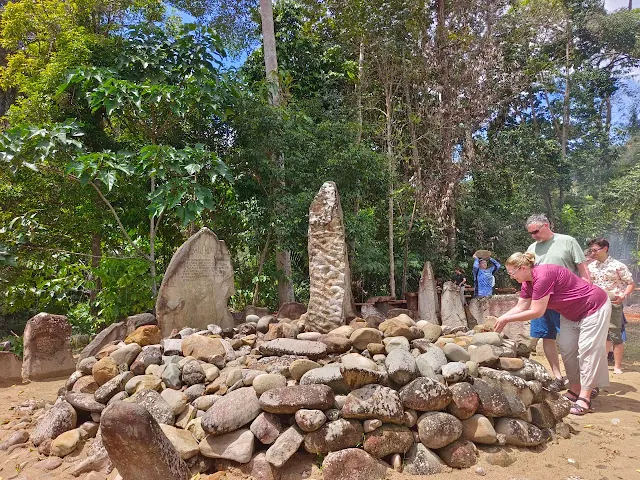12 Americans Enjoy Batu Ruyud Writing Camp and Add Stones to the Pile
 |
| 12 Americans enjoy Batu Ruyud Writing Camp and add stones to the pile. |
Batu Ruyud Writing Camp: Where is it located?
Batu Ruyud is situated at the heart of "The Heart of Borneo", an area within the customary lands of the Dayak Lundayeh people, in the vicinity of the Kayan Mentarang National Park. Administratively, it is located in Fe' Milau village, Krayan Tengah district, Nunukan Regency, North Kalimantan, Indonesia, in Southeast Asia.
For your information, aside from Ubud, Makassar, and Java, there is another national literacy center. It is the Batu Ruyud Writing Camp, initiated by national literacy advocate Dr. Yansen Tipa Padan, M.Si.
Mr. Yansen is supported by the "tiga jagoan literasi nasional" (three national literacy champions) —Masri Sareb Putra, Pepih Nugraha, and Dodi Mawardi—who have helped establish it as a literacy camp.
The Batu Ruyud Writing Camp was first utilized by 14 national literacy activists.
For a week, they engaged in literacy activities with the residents of Krayan at the spacious and scenic ranch.
Besides hosting reading and writing events, poetry readings, writing workshops, teacher meet-ups, and discussions, the first Batu Ruyud Writing Camp took place from October 27 to November 3, 2022.
Yansen TP's Perspective
Dr. Yansen TP, M.Si., owner of the Batu Ruyud ranch in Fe' Milau, Krayan, North Kalimantan, offers a striking perspective. He highlights the stark contrast between the attitudes of Americans and Indonesians in the activities and process of building stone inscriptions at the Batu Ruyud Writing Camp.
 |
| Dr. Yansen TP, M.Si., owner of the Batu Ruyud ranch. |
Yansen TP noted, "Americans embrace it with enthusiasm. Indonesians see it as a burden," in a message shared in the Batu Ruyud Writing Camp I WhatsApp group today (05/22/2024).
The 12 Americans who ventured into Krayan were Jordan Marsh, David Revell, Rebekah Payne, Esther McKaig, Christin Wisniewski, Wesley Bowles, Jonathan Gross, Katie Johnson, Marcus Ramirez, and Jack Clay. These young individuals are future MAF pilots, social workers, and humanitarian mission participants in Kalimantan. They were accompanied by Mr. Dan and Mrs. Jodi.
The 12 Americans carved their everlasting names into the stone surfaces
Indonesians tend to feel burdened when asked to participate. They may see it as an additional task or obligation. For some, this project might be viewed as a routine activity, not something particularly special.
Engraving their names on the stone surface, to be immortalized when it becomes a foundation.
"Americans are enthusiastic about making history; Indonesians consider it an ordinary activity. Americans are very consistent with their values, while Indonesians do things just to get by. There are many other differences we can see from these photos," explained the man born in Pa' Upan, Krayan.
In Yansen's view, there is also a difference in consistency with values. Americans seem to adhere consistently to their principles, striving to reflect these values in their actions. In contrast, Indonesians tend to have a "just enough" attitude.
The differences in attitudes, motivations, and perceptions between Americans and Indonesians in something as simple as carrying and arranging stones at the Batu Ruyud Writing Camp are stark. This reflects the cultural and value differences between the two countries.
It's worth noting that "ruyud" in the local Lengilo' language means: cooperation, working together. This stone is a symbol. It represents collaboration. One plus one is not just 2, but can be more than 2, even limitless.
The philosophy of Batu Ruyud is cooperation, mutual assistance, giving and receiving. A gradual action that becomes a habit, leading people to the highest human values: compassion.
 |
| With joy and enthusiasm, they plunged into the swiftly flowing Milau River (Fe' Milau) from the mountains, gathered stones, and added them to the pile at the Batu Ruyud Writing Camp monument. |
Yansen kind of "mandates" that everyone who comes to Batu Ruyud must bring a stone from the Milau River to the existing pile. This is not only a symbol of cooperation but also proof that they have been here and contributed to this highly valuable humanitarian legacy. Their names will be recorded in history!
Batu Ruyud Writing Camp I
In Tarakan, while welcoming 12 American guests over tea and coffee in a relaxed atmosphere (05/17/2024), Yansen explained that Batu Ruyud was once an unknown area.
"Now, just Google it! You'll find many narratives about this place. Fifty-four years ago, our parents walked us through this place."
On the inscription of one of the tall stones at the back, there is a clear depiction of the journey of Samuel Tipa Padan and Ruslen Betung. The ancestors of the Tipa Padan family not only brought their descendants out of literal isolation but also symbolic isolation.
 |
| National literacy advocates and declarers of Dayak and Sunda Literacy at Batu Ruyud Writing Camp I. |
Just to inform you, during the Batu Ruyud Writing Camp I, two literacy declarations resonated here. The first was the Dayak Literacy Declaration by 8 declarators, read by Masri Sareb Putra on November 2, 2022. The second was the Sunda Literacy Declaration, read by Herman Syahara.
A Book as a Pillar of Immortality
From Batu Ruyud Writing Camp I, a book titled Mejelajahi Misteri Perbatasan (Exploring the Border Mystery: Batu Ruyud Writing Camp I, Krayan, 2022) was published, written by 14 wordsmiths and national literacy activists.
 |
| Ytprayeh.com |
The book, with xlvi + 222 pages, ISBN 978-623-88971-0-0, was published by PT Sinar Bagawan Khatulistiwa. It is a significant and historical milestone that immortalizes literacy and Batu Ruyud in a narrative accessible to the entire world.
-- Rangkaya Bada











